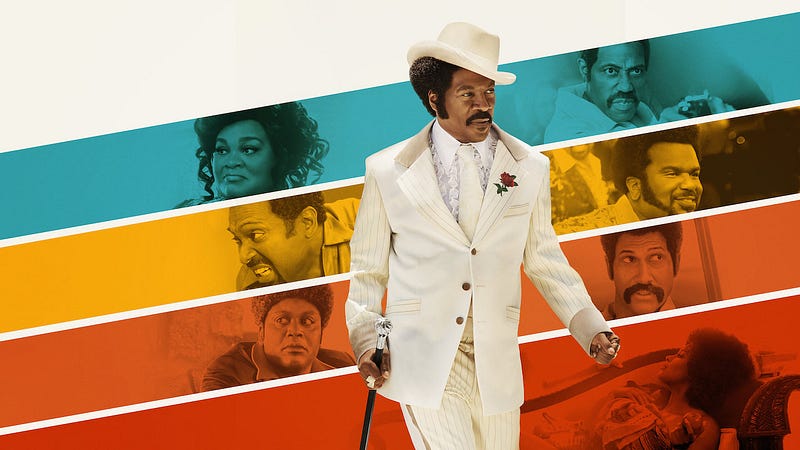
Dolemite Is My Name: A Film Review
Eddie Murphy’s Comedy Muscle is Still Strong
Ratings: 4 1/2 out of 5 Stars
Cast
Credited cast:
Kodi Smit-McPhee …Nick
Snoop Dogg …Roj
Chelsea Gilson …Carrie Mills
T.I. …Walter Crane (as Tip ‘TI’ Harris)
Ron Cephas Jones … Ricco
Depending on how long you may have lived on this planet, we are blessed with over a thousand memories. Each memory is a world within itself. Memories can be happy, sad, tragic, awe-inspiring or any of the numbers of feelings we have. Music is a big part of our memories and even comedy. As a kid, I remember Rudy Ray Moore’s Dolemite, this outrageous caricature who didn’t fit into those conventional norms society was celebrating at the time. Dolemite was this underground take no prisoner comic. He was raunchy, he was vulgar, he was funny. He was not your Bill Cosby, sans rape convict. He was not your Richard Pryor. The closest I would say was that he was in the vein of Moms Mabley and Redd Foxx. Dolemite was this fixture in the predominately urban communities of the ’70s. Before there was the Internet or social media, his fame grew through word of mouth and whispers.
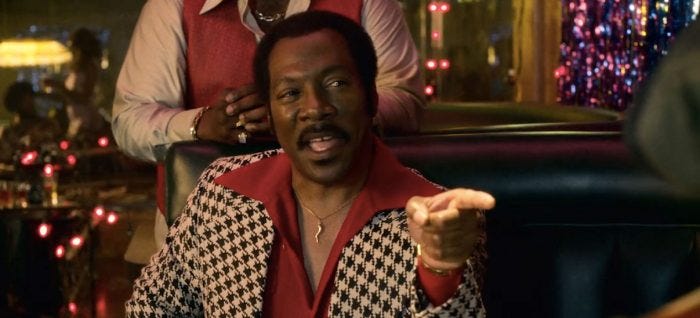
In the Netflix film, Dolemite Is My Name, Eddie Murphy takes on the titular role that polishes this apple of comedy in such a way that introduces the rest of the world to this comedic genius. We are taken on this journey of self-discovery as this man finds his own abilities and trusts his own instincts opening up to this world of ribald humor.
As the film opens up, there is a mood and feel to it that sets the tone of the era and that is the soundtrack. There was a style of music during that time of films of which the blaxploitation era evoked. If you can recall Superfly or The Mack, it was that sound that lingered through these films and Dolemite doesn’t shy away to bring you to that time. The only problem I had was with a Sly & The Family Stone piece where you could tell it was digital. I would have preferred that it would have been analog just to hear the needle on the grooves and the sound of the hissing coming from the record player. But Eddie Murphy owns this role. He is not just convincing, he seems to submerge himself into the part and as each minute passes, we get to understand this pure genius that was Rudy Ray Moore in all of his unconventionality.
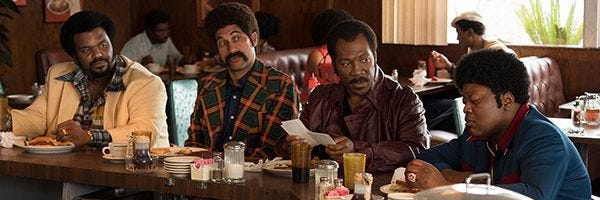
As an MC at a local nightclub, Rudy’s style of comedy is not working. His day job is being an assistant manager at a record shop. The record shop serves as a pivot point for Rudy as this is where Ricco, a down on your luck alcoholic, comes in look for some spare change and a rhythmic ability to curse with poetry. Rudy takes note and later seeks out Ricco and from the film narrative, pays Ricco to recite every filthy limerick he knows. When you see that, you have to wonder after all this time that Ricco never received any recognition for being the inspiration behind Dolemite for it was him who, for the better part, created the Dolemite persona.
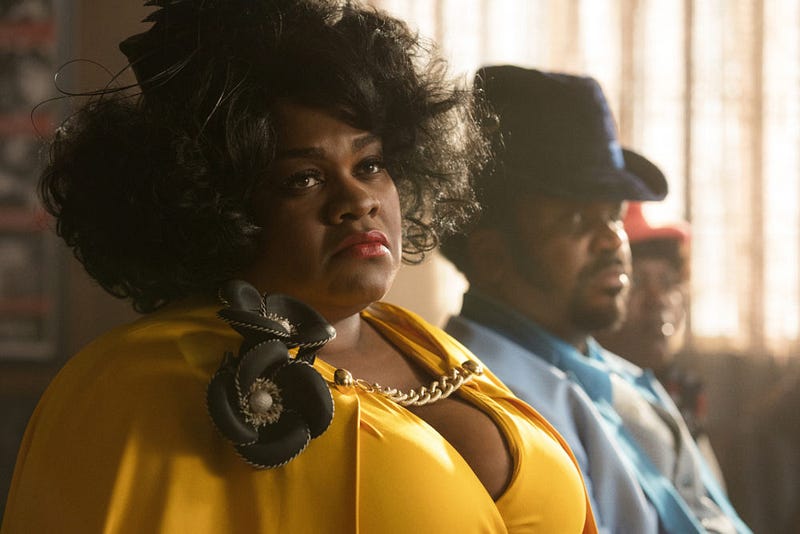
The film doesn’t address this part and instead moves forward with Rudy donning the Dolemite caricature at the nightclub. He gets on stage and becomes the unofficial warm-up act to the band and he kills. I must say that I found a lot of what Eddie/Rudy Ray did was a flashback to my youth. As a former head comedy writer, the selling feature was the rhythmic cadence to Dolemite’s delivery. Once you’ve mastered that cadence, you can never go wrong. Rudy Ray found that rhythm and the race were on.
But stand up wasn’t the end goal for Rudy Ray. He wanted to sell albums and he accomplishes this by pressing his own albums after being turned down by a company for being too vulgar. Rudy was the pioneer of selling his body of work from the trunk of his car, a practice many unpublished rappers had to do in the day to sell their ware. Soon record labels made note of his climbing record sales and he found a home. This was another climb on the ladder for Rudy Ray. But Rudy Ray wanted more.
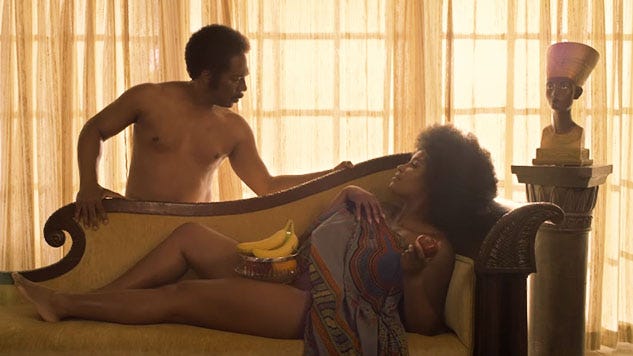
After going to see the movie, The Front Page, a Walter Matthau and Jack Lemmon movie, Rudy Ray and his friends didn’t understand the movie and couldn’t understand why people were laughing. Rudy Ray decides then and there that he wants to make a movie. It is here that the bulk of the film is devoted to Rudy Ray pursuing this dream.
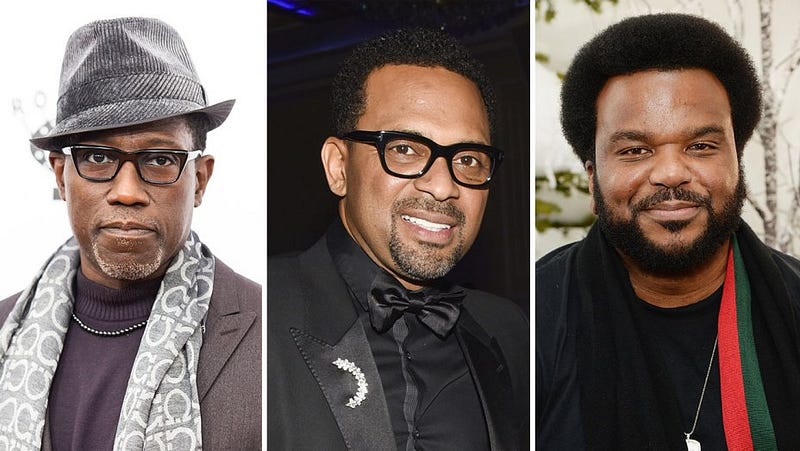
The supporting cast is excellent by the way. Craig Robinson, as Ben Taylor, gets to showcase his musical and singing abilities. Tituss Burgess, as Theodore Toney, is very convincing as a nervous, full of anxiety personality. Mike Epps, as Jimmy Lynch, is the kind of friend, a supportive friend, that you need when every avenue is blocked. Da’ Vine Joy Randolph, as Lady Reed, is the gold standard and this should be her breakout role. She’s excellent and shows the kind of strength black women at that time demonstrated. Wesley Snipes, as D’Urville Martin, is the surprising role of them all. He’s funny, he’s narcissistic, he’s on the verge of always being combustible. When awards season comes about, they should receive a slew of nomination from SAG, the Golden Globes, Oscars, etc. they were just that great.
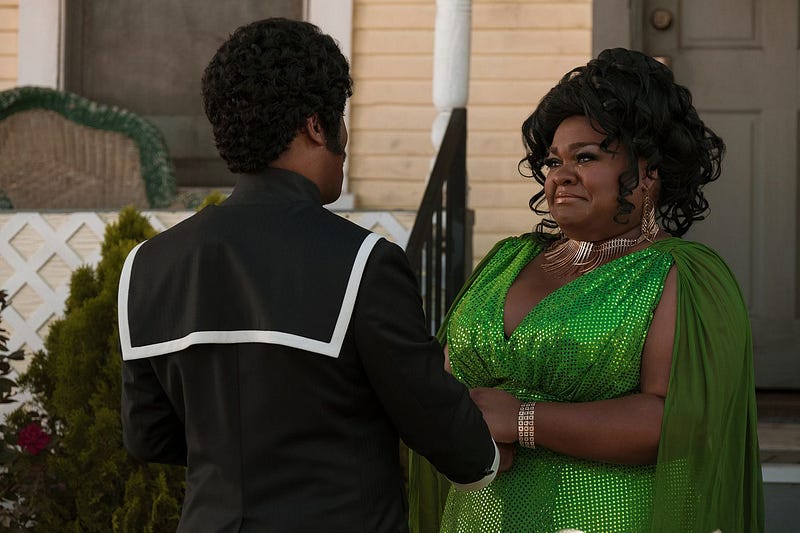
The thing about this film was that it became a story about obstacles. With each obstacle that Rudy Ray faced, somehow he managed to overcome that obstacle through sheer determination and by the happenstance of where he was and the surrounding environment. Eddie Murphy did a commendable job of not only showing the humor of Rudy Ray but also the side roads he had to take to get to that destination. Rudy Ray demonstrated this quiet confidence but had to put on this obtuse bravado to sell himself. He was never a pimp, he just acted like one. The brightly colored clothes were just a uniform for the public and for the business and for the act. His intimate conversation with Lady Reed was raw and honest and their duet was funny and good. They made a wonderful country western song that will never see the light of day on any Nashville radio playlist.
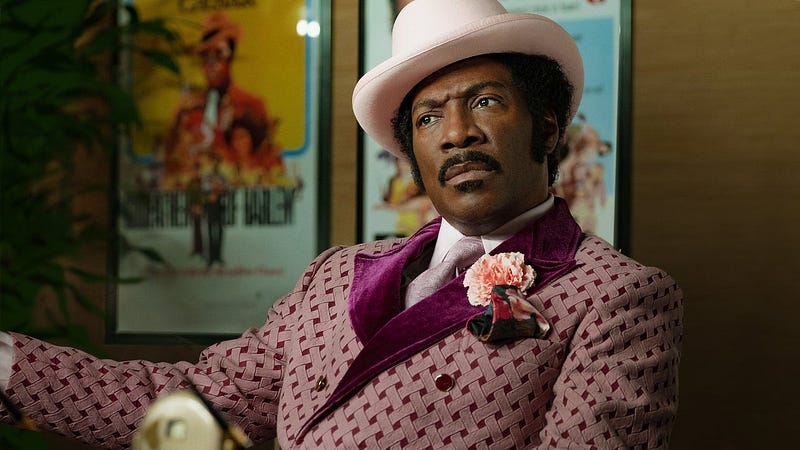
Rudy Ray, with all of his opportunities, was only known in the urban communities. He wasn't a nationwide household name like other famous comics like Richard Pryor, George Carlin, Foxx, or Cosby. He never made it to the late-night talk show circuit. What he did contribute was the style of comedy rap which birth rap music. He’s known as the godfather of rap. His brand of comedy was also instrumental in giving us the comics of the ’80s like the shock comedy of Andrew Dice Clay, Sam Kinison and even Eddie Murphy himself. Comedy is never in a vacuum, it’s forever expanding with its tentacles.
As far as entertainment goes, I’d rate this alongside Dave Chappelle’s Sticks & Stones as good entertainment value. Every new comedy act has an origin story that reaches back to Carlin or Mably or Moore or Lenny, we just never know. At the end of the film, Eddie says a final goodbye to his brother, Charlie Murphy, as the film is dedicated to him. You know that Charlie would have a hand in contributing to the making of this film. Thanks, Charlie.
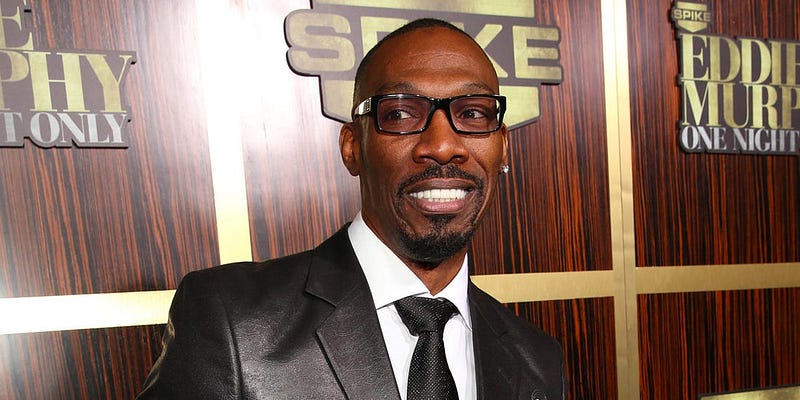
Somewhere Rudy Ray is still in my head as a paraphrase this little limerick attributed to him.
The sparkling stars kiss the sparkling sky
The sparkling moon kiss the sparkling sky
The sparkling wine kiss the sparkling glass
And you, my friend, can kiss my…
See, Rudy Ray just stays with you.
No comments:
Post a Comment